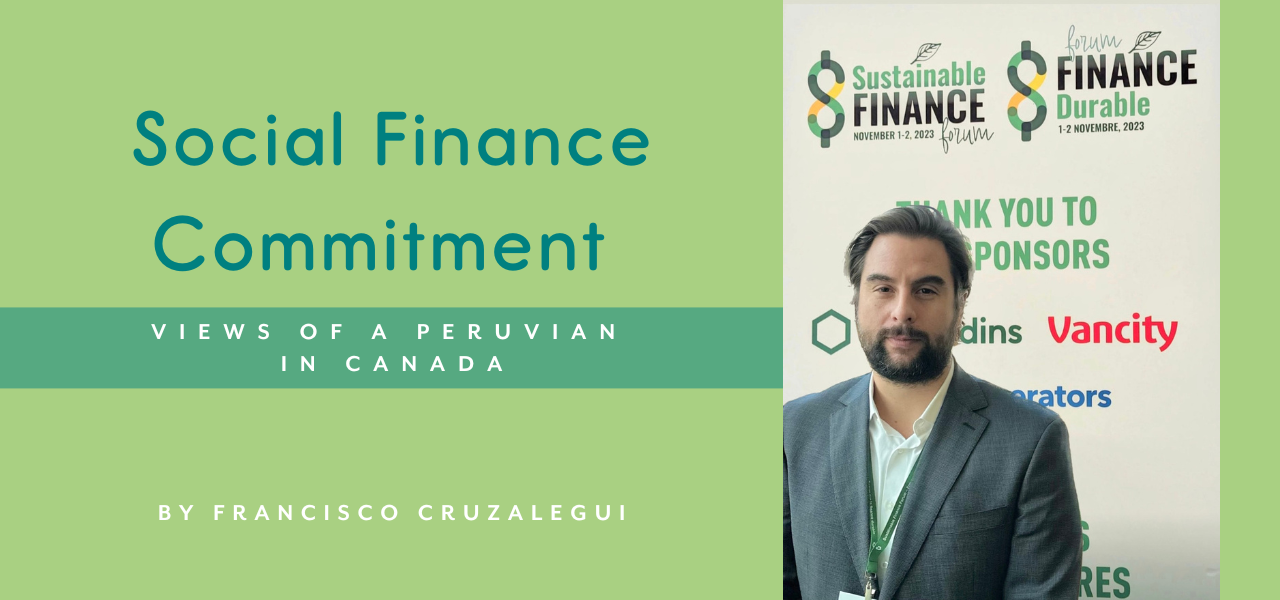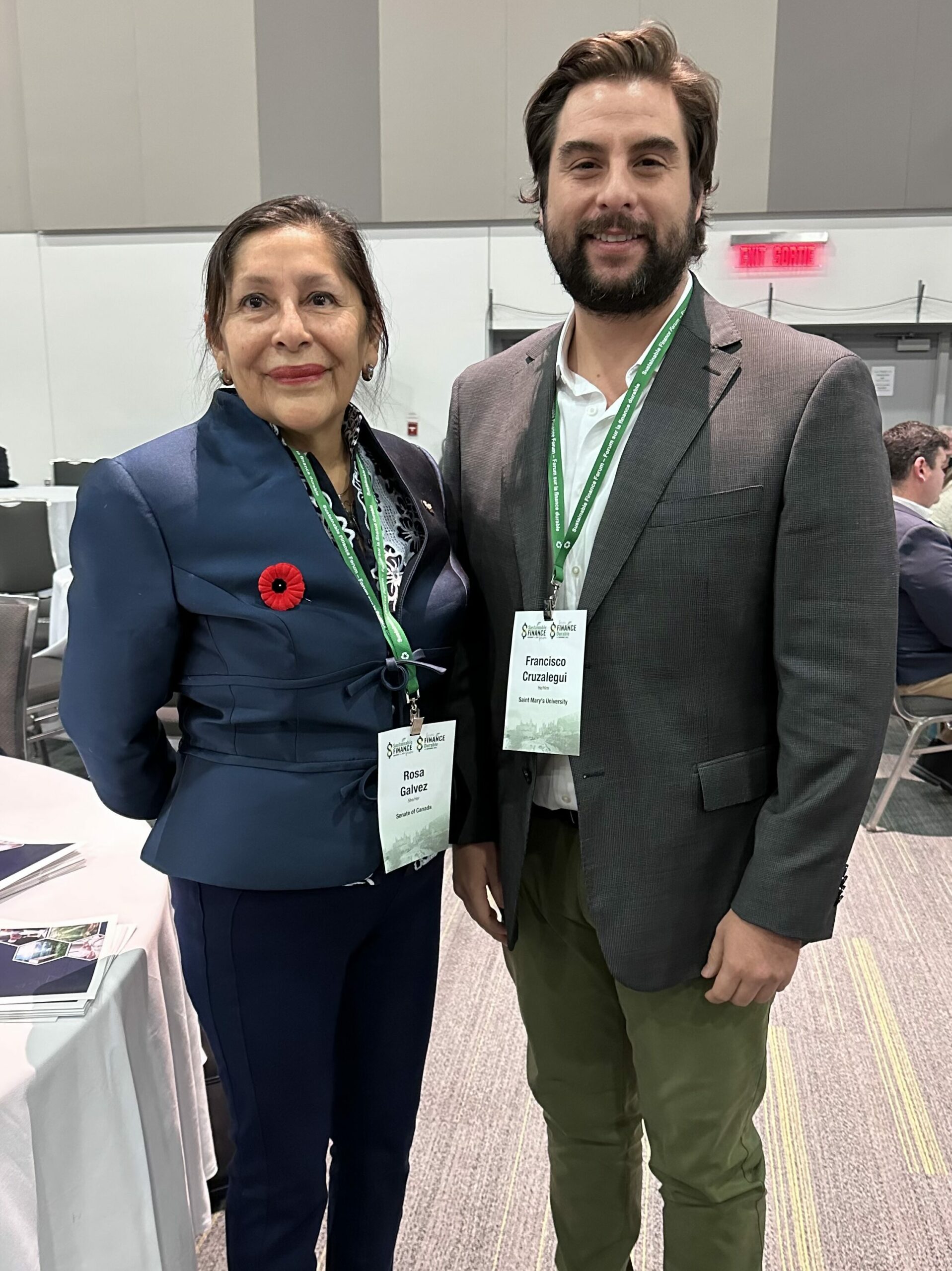Social Finance Commitment

Views of a Peruvian in Canada
by Francisco Cruzalegui
In early November, the Sustainable Finance Forum was held in Ottawa. I decided to attend when it was brought to my attention by a fellow student. I started to think of the many ways this could benefit my home country, Peru, not just for the industries but also the well-being of the Peruvians. Here are some of the highlights and inspirations I took away.
The Member of Parliament for Whitby, Ontario, Ryan Turnbull, said in his opening remarks, “We are on a mission.” This is a generational mission, not just to take action but rather to take ownership to ensure a brighter planet for future generations by creating a sustainable and affordable economy. The time to act is now, we are already behind schedule and we, as citizens of the world, cannot let political and social turmoil take over the agenda in such a pressing matter.
I frequently get asked about my decision to move to Canada, and even though I have a pretty straightforward answer, as time goes by, I realize how much there is to do back home, especially in the transition to clean energy.
There are three high-level themes to my thoughts about the forum:
- the platform I was offered as a student in Canada to interact with government senior officials and leaders from all industries,
- the strong respect given to Indigenous communities, and
- the high level of commitment towards a positive change.
To reduce the impact of climate change, we must use a multi-pronged approach, using an innovation ecosystem as the driver to create sustainable economies with system-wide solutions. This will benefit the environment and also reduce food insecurity, and reconcile social inequities and clean tech. Each nation needs to take action, not just within their own government’s capacity, but to collaborate with private companies by offering tax reductions in order to reach the goal to reduce greenhouse gas emissions between 30% and 45% by 2030.[1]
By 2050, Canada expects to double its energy consumption[2], and the Government and most provinces are creating initiatives to promote sustainable markets. Even though the newly created green bond adds a sustainable investing option, resilience funds are needed, as suggested by Helen Ng, the United Nations (UN) envoy, to foster sustainable growth. Governmental institutions need to shift their approach from response to prevention[3], especially with the extreme weather conditions and record-breaking temperatures affecting the economy and threatening the lives of Canadians. Enforcing the initiative for mandatory disclosures[4] with government suppliers should provide clarity and direction to private firms to follow.

I found great delight in one of the breakout sessions, not only due to its emphasis on the significance of circular economies but also because it was spearheaded by Senator Rosa Galvez, a passionate advocate for robust climate action with roots in Peru. Senator Galvez is wholeheartedly dedicated to crafting environmental policies that facilitate the realization of the Canadian Net-Zero Emissions Accountability Act (CNZEAA) goals by 2052. As Peruvian, I don’t only feel proud but also empowered to take action in my community, school, work, and among my family and friends.
Addressing climate change requires a multifaceted approach, as there is no one-size-fits-all solution. This underscores the significance of embracing a circular economy—an overarching concept focused on efficiently optimizing resources. Effectively implementing a circular economy necessitates a transformative shift in the mindset of industries, governments, and individuals alike. This cultural change is pivotal in fostering sustainable practices across the board. It’s crucial for businesses and entrepreneurs to keep circular economy within the core of their strategies, and governments to support them.
A crucial stride towards mitigating climate change involves the adoption of sustainable procurement practices. This approach centres on orchestrating changes throughout the supply chain, fostering collaborative efforts between government entities and private companies. Together, they engage in the co-creation of policies, the establishment of robust infrastructures, and the generation of substantial value in the production of goods and services.
On our drive back to classes in Halifax, Nova Scotia I kept thinking about what was my mission and the commitments I was willing to make for a sustainable future while contemplating the breathtaking scenery of the Canadian forest. Confidently, I affirm my commitment to harnessing my experience, skills, and sheer determination for the purpose of innovating in the realm of sustainable goods and services.
_____
Francisco Cruzalegui is a Saint Mary’s University student, a candidate for a Master of Technology Entrepreneurship and Innovation degree at the Sobey School of Business.
[1] United in Sciences 2023, World Meteorological Organization (WMO) for the United Nations (UN).
[2] Jonathan Wilkinson, Minister of Energy and Natural Resources, Sustainable Finance Forum, 2023.
[3] Harjit Sajjan at the Sustainable Finance Forum, 2023.
[4] François-Philippe Champagne, Minister of Innovation, Science and Industry.
Share this:
Comments are closed